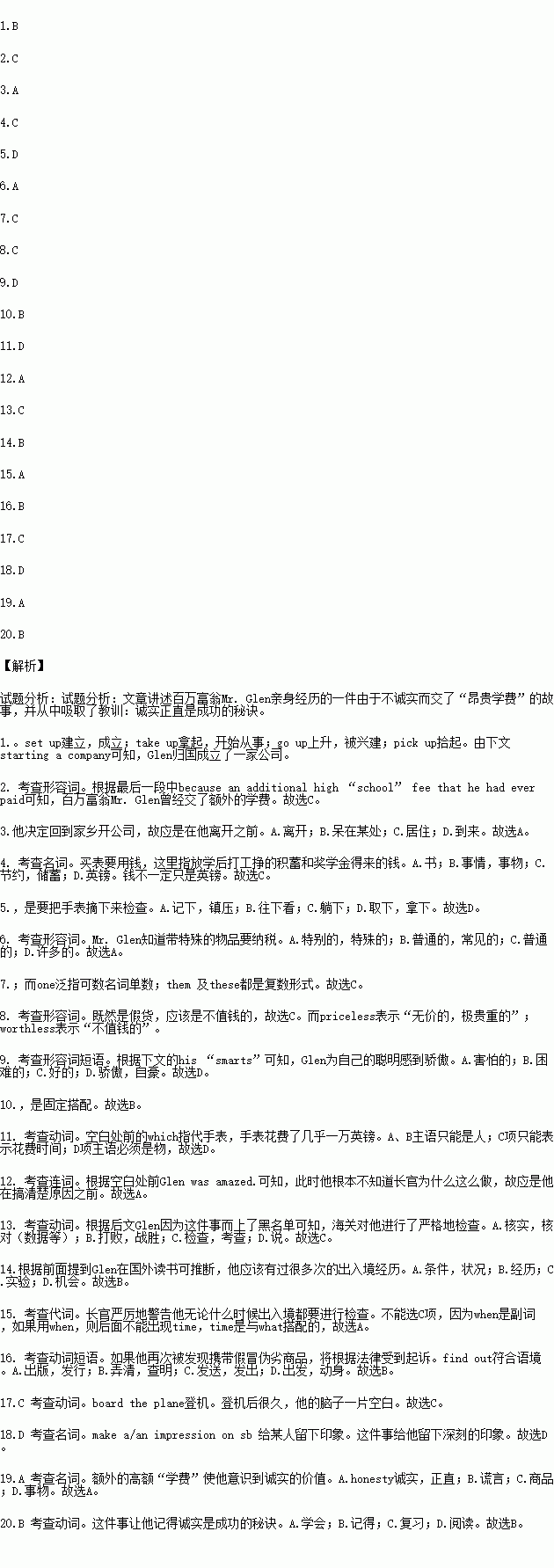题目内容
完形填空
阅读下面短文,从短文后各题所给的四个选项(A、B、C和D)中,选出可以填入空白处的最佳选项,并在答题卡上将该项涂黑。
Mr. Glen is a millionaire. Five years ago, after returning from abroad to his motherland, he _________ up his small company. Speaking of success, Glen often tells us a story about his _________ expensive “school” fees. He always owes his success to it.
At that time, Glen, who already got a Ph. Degree, decided to return to the homeland, starting a company. Before _________, he bought a Rolex watch with the _________ made through years of work after school and the scholarships. At the airport he had to accept the routine customs check. The watch on his wrist was also demanded to be _________ down for inspection. Glen knew that carrying the _________ goods out had to pay the tax. And he worried about paying _________ for his watch. So when he was checked, he told a lie that his watch was a _________ fake(假货). When he was _________ of his “smarts” immediately, _________ the presence of Glen, the officers hit the watch, which _________ nearly ¥100,000, into pieces at hearing Glen's words. Glen was amazed. _________ he understood why, he was taken to the office to be _________ strictly. For many times of entry?exit _________ he knew that only those people in the “blacklist” would “enjoy” this special treatment. The officers looked out every thing carefully in the box, and warned him _________ time of entry and exit he must accept the check and if _________ reusing and carrying fake and shoddy (劣质的) goods, he would be charged according to law! Suddenly, his face turned red, and he had nothing in mind after _________ the plane for long.
After returning to the homeland, he often told the story to his family, and his employees, too. He said that this made a deep _________ on him, because an additional high “school” fee that he had ever paid made him realize the value of _________ , which he would _________ as the secret of his success forever.
1.A. came B. set C. went D. called
2.A. good B. bad C. extra D. few
3.A. leaving B. staying C. living D. coming
4.A. books B. things C. savings D. pounds
5.A. put B. looked C. lied D. taken
6.A. specific B. common C. ordinary D. many
7.A. one B. them C. it D. these
8.A. priceless B. valuable C. worthless D. wonderful
9.A. afraid B. hard C. well D. proud
10.A. on B. in C. before D. after
11.A. paid B. spent C. took D. cost
12.A. Before B. After C. If D. Though
13.A. checked B. beaten C. examined D. spoken
14.A. conditions B. experiences C. experiments D. chances
15.A. no matter what B. no matter how
C. no matter when D. no matter why
16.A. came out B. found out C. sent out D. set out
17.A. landing B. flying C. boarding D. catching
18.A. expression B. idea C. thought D. impression
19.A. honesty B. lies C. goods D. things
20.A. learn B. remember C. revise D. read
书面表达)
假设你是李华,你的英国笔友Liz最近对中国古钱币产生了兴趣,想请你介绍一种中国的古币。请你根据以下写作要点为她介绍唐朝开元通宝。
词数:100左右(开头结尾已给出,不计入总词数)。
适用朝代 | 唐朝 |
形状 | 圆形方孔 |
材质 | 铜 |
历史意义 | 开元通宝见证了唐朝经济的繁荣与发展。开元通宝的使用结束了延绵七百余年的五铢,是唐代以后各代铜钱的标准;在钱币发展史上占有重要地位。 |
参考词汇:开元通宝:Kai Yuan Tong Bao coin 方形:square 铜:bronze
五铢: Wuzhu coin
注意:1. 词数100词左右,不包括已给出内容。
2. 可根据文章内容进行合理拓展。
Dear Liz,
________________________________________________________________
________________________________________________________________
________________________________________________________________
________________________________________________________________
________________________________________________________________
________________________________________________________________
________________________________________________________________
________________________________________________________________
Yours,
Lihua

